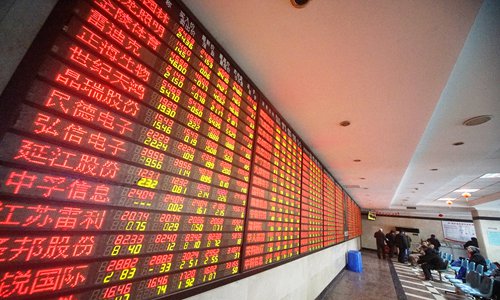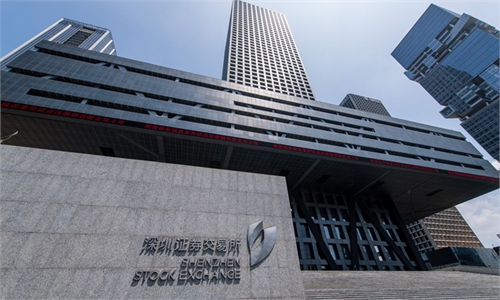
Investors track stock prices on big screens at a local brokerage firm in Nanjing, capital of East China's Jiangsu Province on Tuesday. Photo: VCG
Chinese and other Asian equity markets rallied on Thursday, after US stocks surged to new highs on US President Joe Biden's inauguration day. Experts said that investors' sentiment was driven higher as they saw Biden sending a more cooperative message than his predecessor, injecting hopes that China-US relations might take a turn for the better from the Trump era.
The Shanghai Composite Index rose 38 points, or 1.07 percent, to close at 3,621.26 points. The Shenzhen market was up by 1.95 percent to 15,520.60 points, while the tech-heavy ChiNext market rose 2.46 percent to 3,283.72 points. Non-ferrous metals, rare-earth and pharmaceutical shares led the rally.
Other Asian stock markets also rallied. Japan's Nikkei 225 index rose 0.82 percent, while South Korea's Korea Composite Stock Price Index rose 1.49 percent. Hong Kong's Hang Seng Index exceeded the 30,000-point mark for the first time since May 2019 during the morning session. It closed at 29,927.76 points.
Major US stock indices surged to new highs on Wednesday. The Dow Jones Industrial Average gained more than 0.83 percent to finish at 31,188.38; the S&P 500 closed up more than 1.39 percent at 3,851.85, while the Nasdaq Composite Index finished the session 1.97 percent higher.
Biden assuming the presidency was a major reason behind Chinese mainland stocks' gains, as the new US president sent a strong signal of cooperation in the policies he has announced, analysts said. This made the market confident about a softening attitude toward China-related issues, compared with his predecessor Donald Trump.
"Joe Biden's inauguration speech apparently showed an inclination toward multilateralism, which strengthened the market's anticipation of stronger trade cooperation. Although he didn't clarify his policies toward China, his general policy tone led the market to expect China-US relations will improve, with lifting of Trump's tariff barriers," Dong Shaopeng, a senior research fellow at the Chongyang Institute for Financial Studies of Renmin University of China, told the Global Times on Thursday.
Experts also noted that the markets had worried about whether the US presidential transition would take place without disruption, but now that everything appears to have settled down. They also noted that the US' rejoining to the Paris climate accord is a strong bonus to the new-energy sector.
"The new US administration's foreign policy is expected to be softer, which is expected to adopt a more accommodative and rational attitude in diplomatic policies, which is beneficial for the improvement of China-US relations and will lift the market's risk appetite," said Kang Chongli, director of the research center under Yuekai Securities.
However, experts noted that Biden's assumption of the presidency will mostly bring a short-term stimulus for Asian stocks, as China-US strategic competition won't change. Besides, the US stock market is at risk of a plunge this year, which will shadow Asian markets.
"The most important reason behind the A-share surge is still China's solid economic growth and the market potential, instead of external factors," Dong said.



